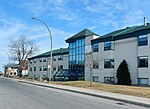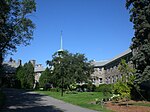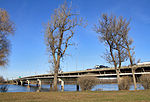Montréal–Trudeau International Airport (IATA: YUL, ICAO: CYUL) (French: Aéroport International Montréal-Trudeau) or Montréal–Trudeau, formerly known and still commonly referred to as Montréal–Dorval International Airport (Aéroport international Montréal-Dorval), is an international airport in Dorval, Quebec, Canada. It is the only Transport Canada designated international airport serving Montreal and is situated 20 km (12 mi) west of Downtown Montreal. The airport terminals are located entirely in the suburb of Dorval, while one runway is located in the Montreal borough of Saint-Laurent. Air Canada, the country's flag carrier, also has its corporate headquarters complex on the Saint-Laurent side of the airport. It also serves Greater Montreal and adjacent regions in Quebec and eastern Ontario, as well as the states of Vermont and northern New York in the United States. The airport is named in honour of Pierre Elliott Trudeau, the 15th Prime Minister of Canada and father of current Prime Minister Justin Trudeau.
The airport is one of two managed and operated by Aéroports de Montréal (ADM), a not-for-profit corporation without share capital; the other is Montréal–Mirabel northwest of Montreal, which was initially intended to replace the one in Dorval but now deals almost solely with cargo. Montréal–Trudeau is owned by Transport Canada which has a 60-year lease with Aéroports de Montréal, as per Canada's National Airport Policy of 1994.Trudeau is the busiest airport in the province of Quebec and the third-busiest airport in Canada by passenger traffic, with 15.9 million passengers in 2022. It is one of eight Canadian airports with United States border preclearance and is one of the main gateways into Canada with 13.1 million or 65% of its passengers being on non-domestic flights, the highest proportion amongst Canada's airports during 2018. It is one of four Air Canada hubs and, in that capacity, serves mainly Quebec, the Atlantic Provinces and Eastern Ontario. On an average day, 53,000 passengers transit through Montréal-Trudeau.
Airlines servicing Trudeau offer year-round non-stop flights to five continents, namely Africa, Asia, Europe, North and South America. It is one of only two airports in Canada with non-stop flights to five continents, the other being Toronto Pearson International Airport. Trudeau airport is the headquarters of and a large hub for Air Canada, the country's largest airline. It is also the headquarters of Air Inuit and Air Transat, and an operation base for Sunwing Airlines and Porter Airlines. It also plays a role in general aviation as home to the headquarters of Innotech-Execair, Starlink, ACASS and Maintenance Repair & Overhaul (MRO) facilities of Air Transat and Air Inuit. Transport Canada operates a Civil Aviation Maintenance, Repair and Overhaul facility on site, with a fleet of Government owned and operated civil aircraft. Bombardier Aerospace has an assembly facility on site where they build Global and Challenger business jets.








